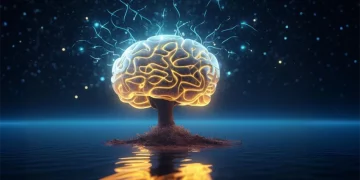We’ve all been there: standing in the aisle, scrolling endlessly online, wracking our brains for that perfect something that speaks to our loved one’s soul. But what if I told you there’s a science behind the art of gifting? Understanding the brain science of gifting can help us move beyond the guesswork and create thoughtful, impactful presents that leave a lasting impression.
Think back to a time when you received a gift that truly resonated with you. It wasn’t just about the gift itself, but the emotions it stirred within. Maybe it made you feel seen, understood, appreciated. This is the magic of gifting woven into our very biology.
Why We Give: A Peek Inside The Gift-Giving Brain
Deep within us, a fascinating interplay of brain regions governs how and why we give. This complex system is responsible for the warm glow we feel when we find the perfect present. It’s the driving force behind our desire to bring happiness to others.
The Role of Dopamine: The “Feel-Good” Factor
Remember that warm, fuzzy feeling you get after a great workout or when you accomplish a challenging task? That’s dopamine, a neurotransmitter associated with pleasure and reward, working its magic. Interestingly, this very same neurochemical is also activated when we give gifts, not just when we receive them.
Yes, the very act of picking out that perfect present for someone triggers the reward centers in our brain. Studies show that people who give benefit regardless of whether they gain something from gifting to someone else. It seems that the act of giving alone is enough to trigger this feel-good rush.
More Than Material: The Emotional Weight of Gifting
The science of gifting goes deeper than a simple dopamine rush. Giving is an inherently social act that strengthens bonds and fosters feelings of connection. When we take the time to choose and give a gift to someone, it’s a tangible expression of our care, consideration, and understanding of who they are.
Researchers have found that giving gifts activates brain regions associated with social bonding and empathy. Essentially, giving makes us feel closer to the recipient, reminding us of the importance of these relationships in our lives. Research suggests that giving is a natural human instinct, triggering a cascade of positive emotions, boosting happiness, self-esteem, and a sense of purpose in both the giver and receiver.
The Psychology of Gift Receiving: Unwrapping More Than Meets The Eye
The joy of receiving a well-chosen gift is undeniable. That giddy anticipation, the element of surprise, the delight as you unwrap something thoughtfully chosen just for you – it all adds up to an experience that lingers long after the occasion. It’s a powerful reminder that someone cares about us and wants to make us happy.
From Material Possessions to Meaningful Connections
While the old adage might say “it’s the thought that counts,” both the thought AND the gift itself contribute to a fulfilling experience for the receiver. When we receive a gift that aligns with our interests, needs, or desires, it reaffirms that we are seen, appreciated, and valued for who we are.
It’s a way for the giver to say, “I get you,” and that can be incredibly powerful. A good gift can make us feel understood and loved, strengthening the bond between the giver and receiver.
Reciprocity: Completing the Circle of Giving
The brain science of gifting doesn’t end there. Receiving a gift often ignites a natural desire to reciprocate, expressing our gratitude and appreciation. This sense of reciprocity, deeply rooted in human psychology, helps sustain relationships and reinforces social bonds. It becomes a beautiful, cyclical exchange that strengthens our sense of community.
Choosing the Perfect Present: Tapping Into The Science of Giving
Knowing there’s actual science behind successful gifting might feel daunting. But don’t worry. We’re here to help you decode the brain science of gifting and become a master gift-giver. By understanding how our brains respond to gifts, you’ll be able to elicit true joy and appreciation from your loved ones.
Think Experiences, Not Just Things
Material goods can be great. However, studies have shown that gifting experiences, like a cooking class, concert tickets, or a weekend getaway, often create more happiness for both the giver and receiver. Experiences foster shared memories, provide opportunities for personal growth, and contribute to a sense of fulfillment that a physical item might not always achieve.
This is also called “prosocial spending” – where you spend money to build relationships, community or help others. Experiences allow us to create lasting memories with the people we care about, which can strengthen our bonds and bring us closer together.
Personalization is Key: Show Them You *Really* Know Them
Remember, a gift is a form of communication, a way to say “I see you” without using any words. Personalized gift boxes hit different. When you take the time to choose a gift that is uniquely suited to the recipient, it shows that you care about them as an individual.
Take time to truly understand what brings your recipient joy, what are their hobbies or passions? Consider their interests, hobbies, and even their sense of humor. The more personalized the gift, the more special it will be to the recipient.
Focus on Quality Time and Thoughtful Gestures
Don’t underestimate the power of the non-material gift. Offering a handwritten letter, a home-cooked meal, or dedicating quality time to a shared activity can be incredibly meaningful. These gestures require time, effort, and emotional investment. They speak volumes and often resonate on a deeper level than any store-bought item ever could.
The science of gifting provides a fascinating glimpse into the complex interplay of emotions, social connections, and biological responses that this simple act evokes. Whether we’re giving or receiving, understanding the psychology behind gifting empowers us to make choices that cultivate stronger relationships, foster deeper appreciation, and sprinkle a little more joy into the world around us.
Remember, the best gifts come from a place of genuine care, where thoughtfulness trumps monetary value and the connections we forge matter most. By understanding the brain science of gifting, we tap into that deeper meaning and create a more meaningful and joyful experience for both ourselves and the people we care about. So, the next time you’re looking for the perfect gift, remember to think about the psychological science behind it.
Also Read This : Brain: Tips to Reduce Mental Stress & Improve Your Lifestyle
Disclaimer:
This article provides general information on the psychology and science behind gifting for educational purposes only. It is not a substitute for professional psychological or medical advice. Always consult with a qualified mental health professional if you have specific questions about behavior, emotions, or relationships. Well Health Organic does not take any responsibility for the accuracy, completeness, or outcomes of the information provided in this article.

















